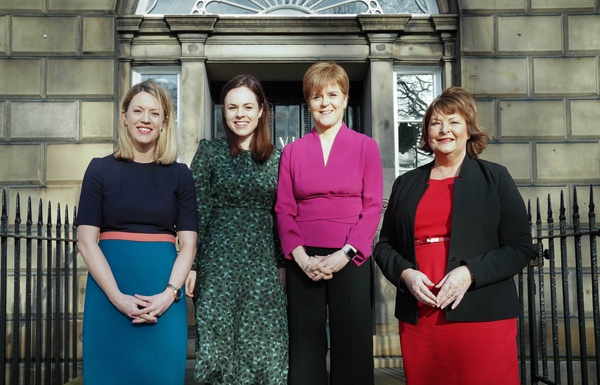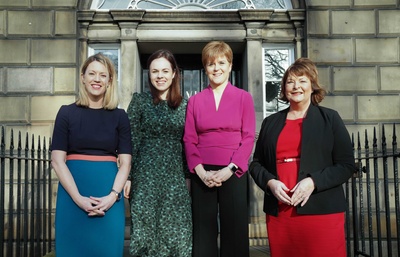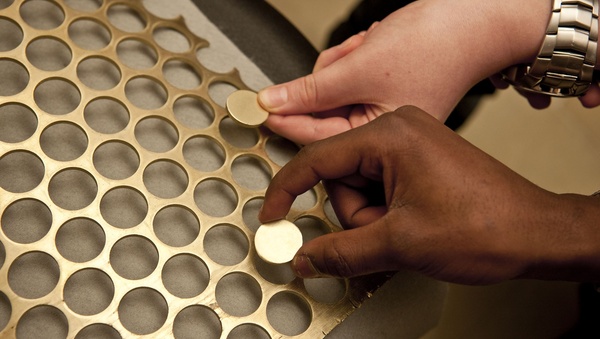Women in Maths (Part 2)

To celebrate women in Maths Day (12 May) we interviewed six women with maths at the core of their role and will be releasing the videos throughout May.
Our next two videos are women who work with large numbers which affect all of our lives. Kate Forbes is the Cabinet Secretary for Finance for Scotland and Esther Roughsedge is a Statistician at National Records of Scotland.
We also want to hear from you! Share a picture of yourself at work telling us how you use maths in your role, or create your own videos. If you have kids at home perhaps get them to interview you!
Kids (and adults!) often struggle to identify why maths is useful unless they want to be a maths teacher or banker. Talking to kids about the maths you use at work can help them build a positive relationship with maths and relate their schoolwork to their future.
Share on Bluesky or Facebook or email us at mathsweekscot@nms.ac.uk
#ShowYourWorking #WomenInMaths #MathsWeekScot
Kate Forbes
Cabinet Secretary for Finance
Kate Forbes is an Member of Scottish Parliament and the Cabinet Secretary for Finance. Kate was the first woman to deliver a Scottish budget.
Kate is responsible for delivering a balanced budget to ensure the government are investing in the areas most important to the people of Scotland.
https://www.parliament.scot/msps/currentmsps/kate-forbes-msp.aspx
What do you love about your job?
I get an insight into what we’re doing in every area of government from heath to education from transport to infrasturcture.
I use maths on a daily basis because my job is to make sure we use the resources that we have from taxpayers money and also from the UK government to invest in our services and infrastructure. I need to make sure that we don’t overspend, spending more than we have, and that we don’t underspend to make sure every penny goes to supporting people.
How did you get into your career?
I studied maths in high school, I did my higher maths and then I left school and went and eventually trained as an accountant. So I was using maths in my job before getting elected.
Like every other politicians I got this job first by being elected in my constituency of Skye, Lochaber and then after being elected was made a government minister.

Esther Roughsedge,
Statistician, National Records of Scotland
National Records of Scotland maintain the nations archives, carry out the census and produce a range of population statistics. Esther improves the way these statistics are communicated to help more people understand them.
Website: https://www.nrscotland.gov.uk/
Inforgraphics: https://www.nrscotland.gov.uk/statistics-and-data/statistics/stats-at-a-glance/infographics-and-visualisations
Schools activities: https://www.nrscotland.gov.uk/research/learning/services-for-schools
What do you love about your job?
I love that National Records of Scotland work is so important,and that it really makes a difference. We produce statistics on the population of Scotland on where people are living, where the population is growing and where it is falling, levels of migration and life expectancy.
I love my job because I care about these subjects and I can see how important they are, and I get to work with some great people too!
What impact does your work have?
National Records of Scotland's statistics are used in lots of ways. They are used in planning schools, homes, hospitals and transport. For example we are currently reporting the current figures on Covid 19, and these are important for understanding the pandemic, it’s effects and how best to respond.
What do people assume about your job?
People think that to be a statistician you just need to be good with numbers, but that’s not all. It is just as important to have good people skills and communication skills. We need to produce our statistics in a way which is easy to understand and remember, because then people are more likely to use them. You can see examples of how we have done this on the National Records of Scotland website.
How did you get into your career?
I enjoyed maths at school but didn’t think about doing it as a job. I did a degree and PhD in Genetics and I used statistics to analyse my data whilst doing that. Afterwards I fancied doing something different and working in public sector appealed to me.
I saw a job advertised as a government statistician and realised I had the skills they were looking for. I applied for the job, got it, found that I loved it and never looked back!
Why is maths important?
Numbers can help us understand a situation and make better decisions based on evidence. This can include huge things like governments understanding how a disease is spreading, how the economy is doing or whether they need new schools in an area.
For us as individuals, maths skills are important too. That could be working out the best deal when buying something, how much a loan repayment will cost, or how much paint you need to decorate a room. If you look at the numbers you can make better decisions and save yourself money in the long run!
Latest News and Events

STEM Ambassadors in Scotland Week 2026
STEM Ambassador in Scotland (SAIS) Week is a celebration of all things STEM in Scotland through the experiences of our STEM Ambassadors.

Active Maths Challenge
Start the year with our mini Active Maths challenge and measure what progress you can make over four weeks.

Money Maths at Museum on the Mound
We are excited to offer Maths versions of our popular money-themed schools workshops. These are entirely free of charge. Best suited for P5-P7 pupils.